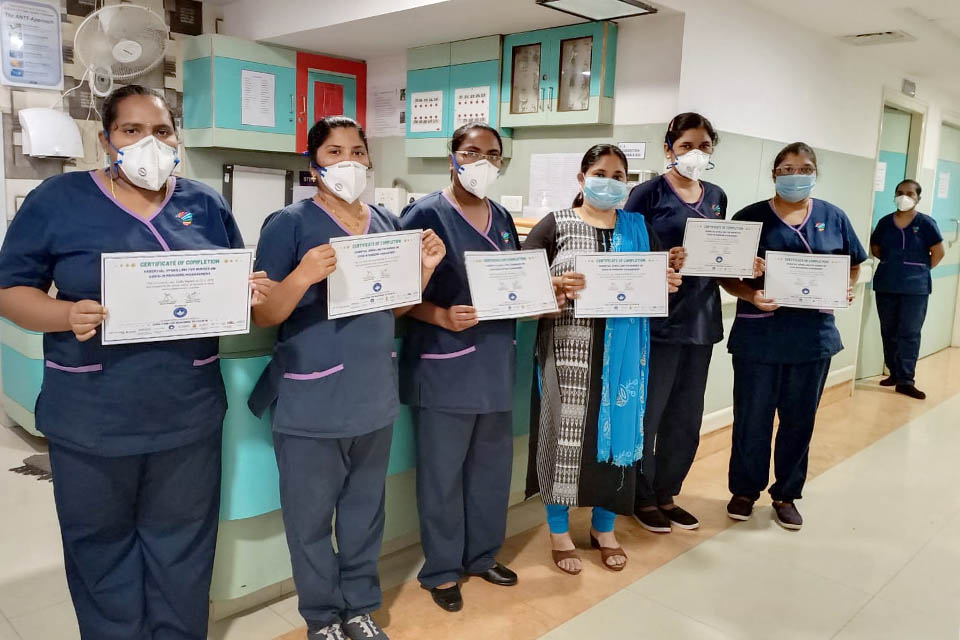
From immediate relief to livelihood support, UN Women drives investment and support for women and girls impacted
by COVID-19 in India
Health workers participating in UN Women India’s Second Chance Education programme display their “Certificate of Completion Essential Upskilling for Nurses on COVID-19 Pandemic Management”. © UN Women
UN Women, 1 June 2021
“It is the responsibility of women to hold the social fabric together – be it at home, in health centres and schools, or caring for the elderly – all of this is unpaid care work (and it continues to increase),” explains Mita Lonkar from the Chaitanya Foundation in New Delhi, India, one of many NGO partners of UN Women in India, providing critical support to women and their families, as the country struggles to cope with the second wave of the COVID-19 pandemic.
“The majority of those on the front lines of the pandemic are women, there’s need to provide resources like healthcare, education and training for women,” adds Lonkar. “Women are particularly vulnerable economically – their personal finances are weaker and their position in the labour market is less secure, as compared to men.”
Since January 2020, India has reported over 27 million cases of COVID-19 infection and more than 300,000 fatalities – figures that many believe are substantial underestimates. As infection rates peak, hospitals have run out of beds and oxygen, medication is running low, and there are vaccine shortages. Last week, the country also saw massive flooding and displacement in its coastal areas, as Cyclone Yaas made landfall.
The scale of the emergency is unprecedented and as with every crisis, women and girls, especially those from poor and marginalized communities, are among the hardest hit. Data from at least seven states indicate that women constitute 34 – 42 per cent of COVID-19 infections. The needs are exponential – from basic needs for food, personal protective equipment, hygiene and sanitation products, and vaccines, to longer term support to get women back into the workforce and access start-up financing.
 Participants in UN Women India’s Second Chance Educational and Vocational Learning Programme. © UN Women
Participants in UN Women India’s Second Chance Educational and Vocational Learning Programme. © UN Women
Worldwide, COVID-19 has led to more job loss for women, and India is not an exception. Female labour force participation was on a downward trend even before the pandemic and women’s earned income was just one-fifth that of men’s – well below the global average. In the informal sector, the situation is worse and 91 per cent of women in India are engaged in informal and home-based sectors. The time that women in India spend on unpaid domestic chores is 10 times more than men. As the pandemic rages on, many women have had to stop paid work to care for their families.
Chaitanya Foundation has been working with UN Women since2019 to roll out its Second Chance Education and Vocational Learning programme in India, which has reached more than 50,000 women. The programme is now facilitating access to employment for women who have completed their training, as well as helping small entrepreneurs who need smaller capital investment, as many of their loans have been denied during the pandemic.
The crisis has made it clear to Lonkar and her team that society must take a hard look at how it values and pays for women’s work.
Susan Ferguson, UN Women Representative in India, agrees: “Whether it’s at home, in the office or in the field, we must stop taking women’s work for granted. And, we must expand educational opportunities for women and girls.”
“UN Women India’s Second Chance Education programme is a good example of how we can simultaneously address the pandemic recovery and offer opportunities for women to advance their careers, by training front-line health workers while providing employment pathways,” adds Ferguson.
Right now, UN Women and its partners in India are providing masks, gloves and other personal protective equipment for front-line responders; training health workers in COVID-19 response; supporting women’s livelihood projects and offering cash transfers to women in need. To mitigate the heightened risk of gender-based violence against the backdrop of existing inequalities, UN Women is also supporting the training of counsellors, social workers and staff at One Stop Crisis Centres –facilities where women survivors can access a comprehensive set of services: medical attention, legal aid as well as temporary shelter.
UN Women is seeking immediate funding to sustain and expand these initiatives.
Access to information is another area of concern for women’s organizations on the ground. “Women’s development and empowerment depends on the availability and accessibility of quality information. Information penetrates every aspect of our daily lives… and yet, it appears that most women lack access to relevant, accurate and timely information,” points out Mita Lonka of Chaitanya Foundation. Misinformation about the COVID-19 disease and vaccination is widespread, and lack of information for women can have fatal consequences.
UN Women is launching communications efforts in partnership with civil society and youth groups to increase access to verified information, fight misinformation and improve women’s knowledge about COVID-19 disease prevention and vaccine, as well as how to access medical services, emergency accommodation or protection orders when escaping violence.
Original article here.